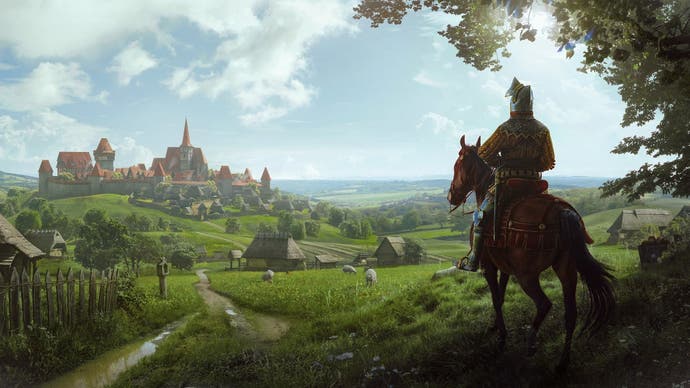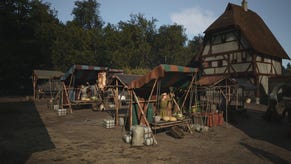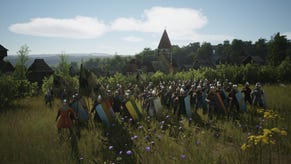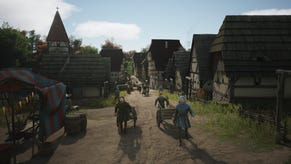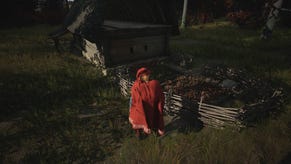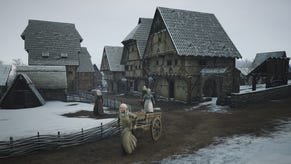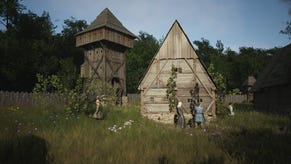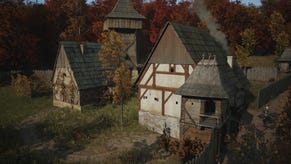Manor Lords early access review - beautiful foundations but missing important pieces
Hooray for the village people.
Yesterday, in between bouts of Manor Lords, I popped down the road to do some food shopping, and bought bread, milk, vegetables, and some other things, then walked home. It took me about 30 minutes all in all, and the whole time I never questioned whether there'd actually be food in the shop when I got there. I didn't think about whether they'd had a good enough harvest to keep their stores full during the winter. I just popped in and popped out, squeezing a fundamental part of my daily subsistence into a lunch break. How much we now take for granted.
Manor Lords has made me think about this because it's a game that pulls just getting by sharply into focus. It's a settlement-building game about the daily toil of living off the land and slowly, gradually, bending it to your will. It's a game about establishing something from nothing, and living in small villages alongside, and very much in view of, the other families who reside there. It's a game about crop rotation and people coming together for harvest time, to feed each other, or to help clothe each other - and eventually, to arm and protect each other. Manor Lords is a window into what life was like in the mediaeval era.
It's also, famously, a game made by only one person over seven years, not that it feels like a solo effort in any way to play. Usually, there's an air of jankiness to solo projects like this, but that's not the case here. Manor Lords, in so many ways, is a remarkable achievement. Visually, it's a pastoral idyll of mist collecting on rolling hills in the morning as birds pass by, or sun throwing long shadows across the meadows by evening. It's the forests turning your horizon from green into shades of orange as the autumn comes, and then white as the snow carpets it all. Then in your village, there's the intricate beauty of seeing your people at work, tending the fields or working the market stalls. Some walk with oxen as they pull logs needed for construction, while the workers bark things like, "Need to house this timber to the gable!" In your ear, choral music and sweeping pastoral scores play out, reminding me more than once of composer Ralph Vaughan Williams' work, which is a very good thing. In the way it plays, there's beauty too. Simply placing a road and watching it dynamically curve around obstacles is a pleasure, as is watching a building you've placed being constructed. There's a confidence here I did not expect.
Note, however, that it's not finished yet. This is an Early Access release, and that's an important thing for anyone tempted to dive in to understand. Not only do things still need work in the game, there's a great deal still to implement. The final third of the game - or maybe even the second half of the game - isn't there yet, so after a dozen or so hours, you'll probably run out of things to do, or you'll lose your sense of purpose. But I'll come back to those points in a moment.
The game begins with you taking control of settlers living in tents and building a village from there, and it plays out on a very small scale. You control a few families who will need to collectively share the basic duties of day-to-day survival, of gathering food, chopping down trees for construction and firewood, and building homes. What you can do depends on the buildings you have, and how quickly you do those things depends on if you have people working specifically in those buildings. But if you put people to work in the buildings - I call them buildings, but they're little more than shacks - then they're not available to help with construction, and considering you have roughly one available worker per family (I think), you'll soon find you have more jobs than you have available pairs of hands.
How to juggle labour, then, is a constant puzzle. I find I move people around according to seasonal need - in the autumn, I need more help farming; in the summer, more help fruit picking; in the winter, more help with firewood, and so on - and I like the natural rhythm that comes from this. It's the rhythm of the land, and it's slow and pleasing, and I know it sounds overly romantic but there's a sense of being out in the elements with the villagers too, and feeling the cold and rain and sun - feeling their lives. Having said that, it can also be a faff moving people around, especially when your settlement grows and you have more people to track and juggle. Manor Lords could do with some high-level menus showing, at a glance, what people are doing and where.
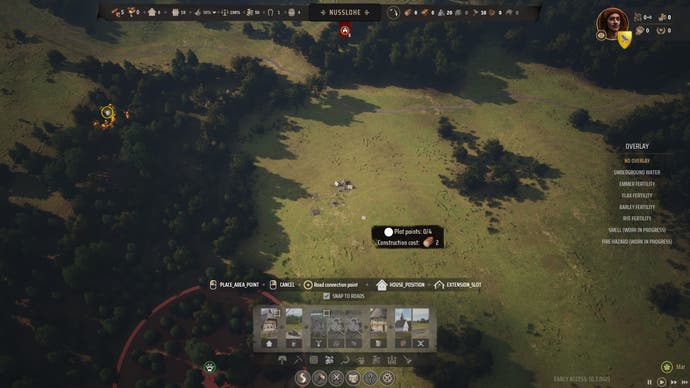
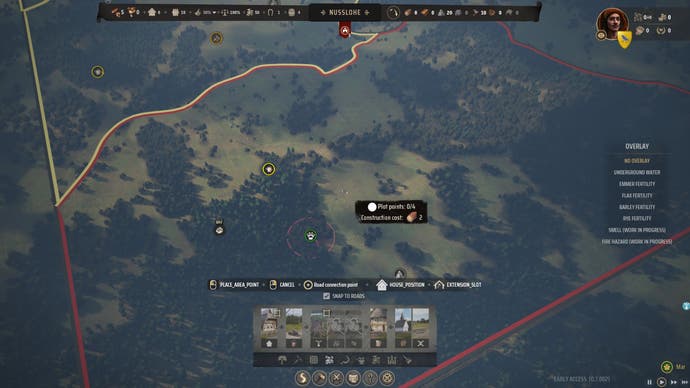
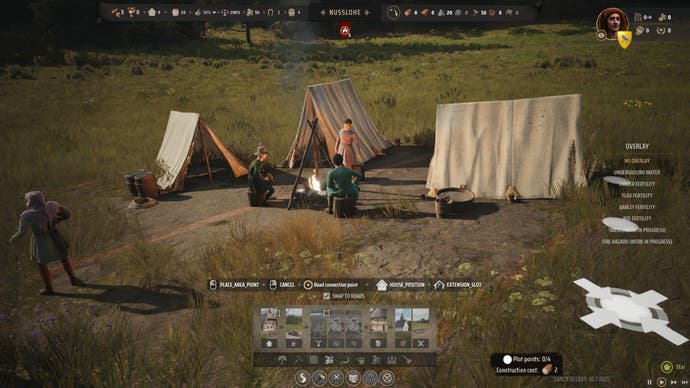
Unlike other settlement building games, though, growth won't come quickly here - in fact, growth hardly happens much at all. Even a dozen hours in, my village is still very much a village, with 55 homes and 166 families - that's the scope the game plays out at. The pace the game plays out at, meanwhile, is 'walking pace'. Everything takes a significant amount of time, as if to reinforce how much time it actually took when people lived like this (there was no popping to the shops on a lunch break then). Whatever you construct needs to be built, and building involves people - as I mentioned - collecting the materials and then transporting them to the building site, then using them to build, which all plays out in detail and takes time. Progress, therefore, comes slowly, which I like - too many games speed past these idyllic early phases, whereas this game revels in them.
However, when things aren't running smoothly, a purposefully slow pace of life can be exacerbated to annoying levels. Sometimes, you'll hit inexplicable bumps in the games and get storage errors despite having adequate storage available, for example, and villagers won't do the jobs you want them to despite all available conditions apparently being met. You can raise construction priorities, directing the flow of labour somewhat, but there's still an element of villagers behaving however they please, and of you not quite having control over them. And in a game that takes its time, any further hold-ups can feel excruciating.
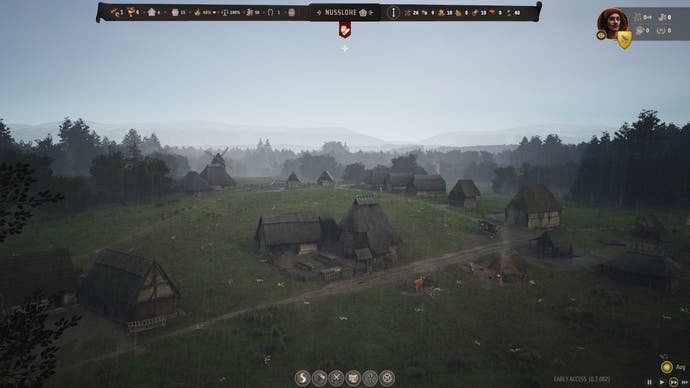

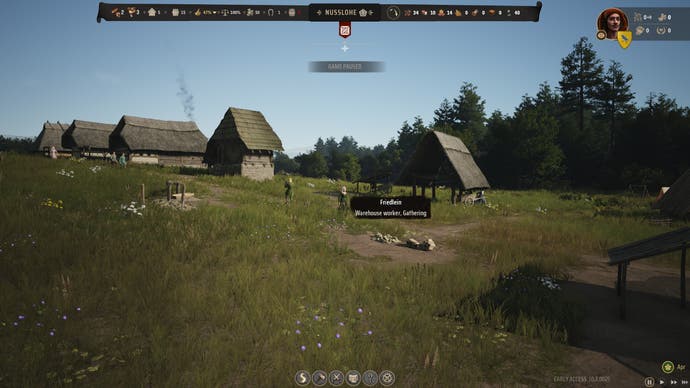
Bit by bit, you'll make headway, and with more homes will come more families to fill them, in turn providing more workers for your village, though also more mouths to feed - hunger and heating never fade entirely into the background. But as you solidify some basic survival processes, you'll afford yourself time to look up and around and begin thinking about other vital functions such as trading, and importing the things you cannot produce, and exporting the things you have an abundance of. But again, trading takes time. To enable the trading of an item, you have to pay to open an available route, and then someone has to physically walk that route with the respective goods.
Trading, though, is crucial for earning one of the game's two types of currency - a kind of wealth relative to the goods you produce. It's this you'll use to pay for almost everything in the game - upgrades, most importantly - but it's a slow process acquiring it. It's an interesting idea because, like other things in the game, it speaks to a sort of trading we no longer use in the world. But it's confusing when used alongside a second currency system (and with little explanation), and the way things are priced seems exorbitantly high. I've no idea why simply unlocking some trade routes needs to cost as much as it does, because it can hold you back from shifting a surplus of goods and earning vital income you need to, say, feed your population. And the upshot is that it takes yet more time to save up for and be able to access.
When you finally do have enough income, you can begin to explore upgrades. To begin with you can do things like create vegetable farms or chicken/goat farms at the back of houses with enough space, but when you upgrade buildings, you can pursue more specialised industries, like brewing or blacksmithing or tailoring, which in turn make use of a broader variety of gathered and refined goods, and then can be traded - if not used by you - for a very high price. I had no idea that homes once had workshops like these attached, so I find it a fascinating historical detail in the game. Indeed, workshops are the only way you can do some of these things. Maybe more importantly, upgrading individual buildings counts towards your progress upgrading the settlement level of your village, which in turn unlocks progress on a development tree and the vital new technologies that come with it, like a heavy plough for my farm, which speeds up my farming greatly. These are individually powerful developments, but the points to unlock them are so scarce it means you'll miss out on many of them, and it doesn't feel great from a gameplay perspective to see buildings with possible developments you can't get to. It doesn't feel great to be reminded of what you can't do.
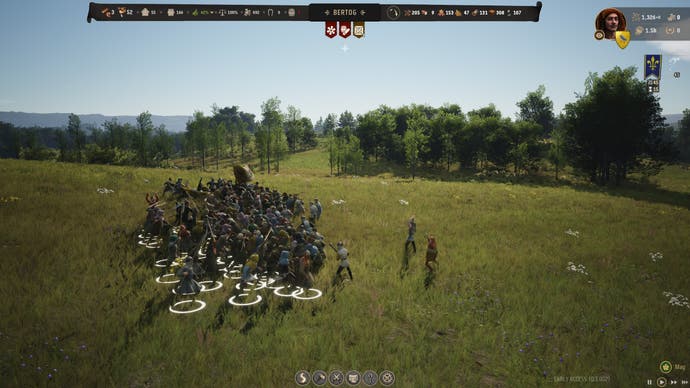

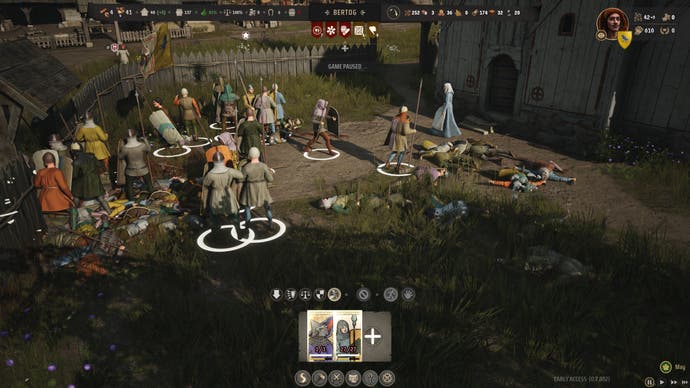
I mentioned blacksmithing there - the game does have weaponry, and the game does have combat. It's a significant side of the game that moves Manor Lords away from being a settlement building game only, and towards an experience like Total War. I say "towards" because it's nowhere near that in depth, but there are similarities there. However, combat in the game is not particularly well represented in the game yet, partly because it's not fully implemented. You can fight, but a lot of the systems related to it, that give it depth and a sense of progression, are not there.
You recruit an army two ways. You can raise from your population militia to fight for you, providing you have enough people to recruit from and enough equipment to fit them out with - swords and shields, spears and shields, polearms, bows, etc. There are varying types of units. But again, because populations grow slowly and because weapons are complex things to make, raising your own militia will be out of your reach for a while. The other way to raise an army is by hiring mercenaries, though you won't have the kind of currency - the coin kind, the second kind - until you build a manor and tax your population, so it comes later in the game.
Still, the game will harry you with bandits and sometimes even raiders, and make you aware of enemy ruler's armies doing things nearby - it will encourage you towards this side of the game. I had to import the spears and wooden shields I desperately needed to fend off an impending raider attack early on, at great expense, because the game was counting down to it. Yet when it did tick zero, the raiders appeared half-way across the map, in someone else's territory, and never troubled me at all. It's indicative of combat in general in Manor Lords at the moment, this experience - half-implemented and unpredictable. I did manage to have a tense battle with some bandits who rushed my settlement, and we ended up facing off outside my church, fittingly, and there were archers firing arrows and spear users protecting their frontlines - and there are glimpses of formations and unit orders and such - but there's no real appreciable sophistication there yet.
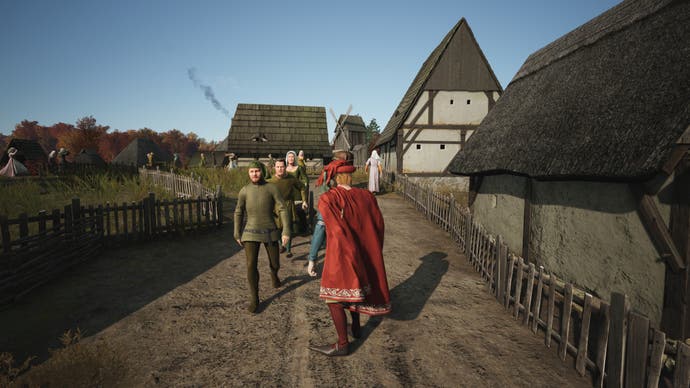
That's part of why I say it feels like there's half a game missing here still. There's a map screen where you survey the nearby land, for example, and engage in relations with other rulers, and it has an imaginative letter-writing feature whereby you can pull pre-written paragraphs onto a piece of parchment to represent your whims. You can negotiate with people or be rude or declare war - whatever you like! And it seems characterful, but it doesn't yet work. Similarly, there's a third-person mode whereby you can explore your settlement as the lord or lady of the manor, and it's a very powerful experience seeing it all from a citizen's perspective. But it's nothing more than that yet - it's not finished.
In fact, there's no real sense in the game of who you - the eponymous manor lord - are. You can build yourself a manor that you can presumably upgrade into a castle later, but at the moment, it doesn't really do much. It just sits there on top of the hill or wherever you built it. It does allow you to tax people and passively build influence, but it feels far from the centre of your civilisation, and there's no actual you visible anywhere - no tangible lord of the manor. Plus by the time I'd raised enough coin to employ mercenary help (mercenary companies which have delightful names and traits, incidentally), there was only one mercenary company left to hire; and by the time I had enough influence to stake a claim on a region, they'd all be taken by another mysterious force I couldn't actually see anywhere. And the stamina-related effort it takes to march an army (if you can call it that) anywhere is tremendous; another time-consuming pursuit in a game filled with them. I run the game at 16-speed much more often than I'd like, zoomed out from the time-lapse-like flowing of my citizens below, disconnected somewhat from their concerns, whereas I want to be up close and involved with them.
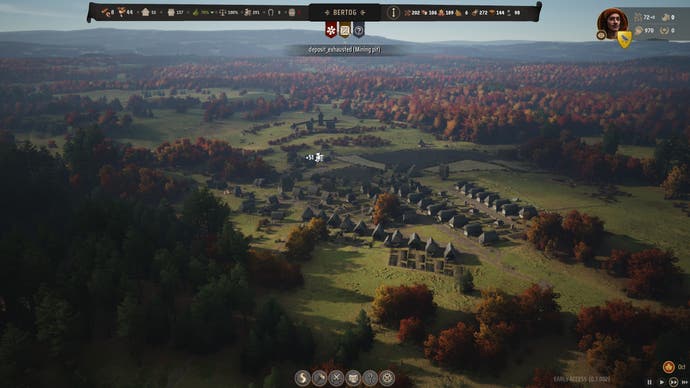
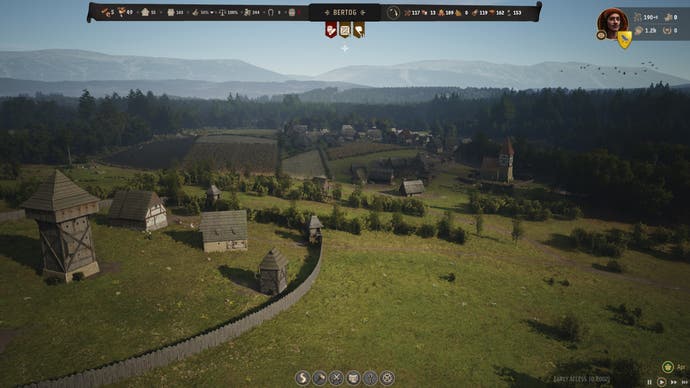
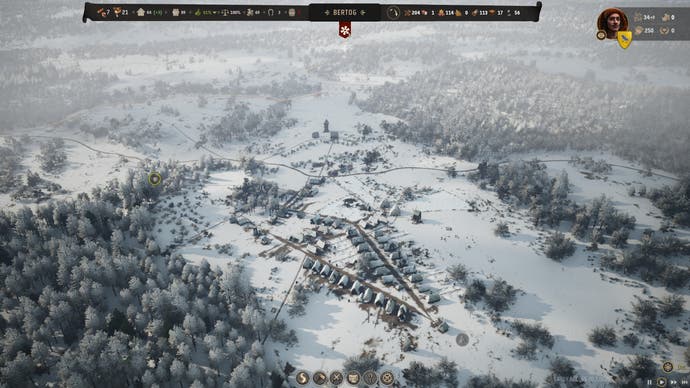
The more I play Manor Lords, the more I see its current limitations: the locked parts of menus and the lack of a sense of purpose past a certain point. I feel the kinks in the simulation keenly as villagers struggle to do things I really want them to do, or in the manufacturing process I can't stop - or in the way I can't easily oversee what everyone is doing. There's tuning that needs to be done here, and tweaking. One of the biggest missing pieces, for me, is any kind of story, or stories coming from the people I'm responsible for. This is a game pitched at their level, close up, and yet there's very little to know about individuals beyond where they're currently going or what they're doing. They don't have a voice or a personality, and giving them those things would massively lift an experience like this.
However, I'm sure all of those things are somewhere in The Plan for Manor Lords, providing the Steam Early Access release goes well - and all indications point to it doing so, given how Wishlisted the game is. I hope that in that process, this game really discovers what it is and how it stands apart from the games the developer has told people it is not - Total Wars and Civilizations of this world (the developer does not mention Farthest Frontier, which it reminds me fiercely of), etc. The potential is there, the foundations are most assuredly laid, it just now needs to build on top of them.
A copy of Manor Lords was provided for review by Hooded Horse.
